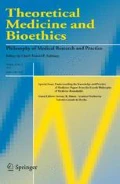Abstract
People have a powerful interest in geneticprivacy and its associated claim to ignorance,and some equally powerful desires to beshielded from disturbing information are oftenvoiced. We argue, however, that there is nosuch thing as a right to remain in ignorance,where a right is understood as an entitlementthat trumps competing claims. This doesnot of course mean that information must alwaysbe forced upon unwilling recipients, only thatthere is no prima facie entitlement to beprotected from true or honest information aboutoneself. Any claims to be shielded frominformation about the self must compete onequal terms with claims based in the rights andinterests of others. In balancing the weightand importance of rival considerations aboutgiving or withholding information, if rightsclaims have any place, rights are more likelyto be defensible on the side of honestcommunication of information rather than indefence of ignorance. The right to free speechand the right to decline to acceptresponsibility to take decisions for othersimposed by those others seem to us moreplausible candidates for fully fledged rightsin this field than any purported right toignorance. Finally, and most importantly, ifthe right to autonomy is invoked, a properunderstanding of the distinction between claimsto liberty and claims to autonomy show that theprinciple of autonomy, as it is understood incontemporary social ethics and English law,supports the giving rather than the withholdingof information in most circumstances.
Similar content being viewed by others
REFERENCES
The Human Genetics Commission. Whose Hands on Your Genes? London: The Human Genetics Commission, 2000 (http://www.hgc.gov.uk/).
Takala T. Gylling HA. Who should know about our genetic make-up and why? Journal of Medical Ethics 2000; 26: 171–174.
Dworkin R. Rights as trumps. In: Waldron J, ed. Theories Of Rights. Oxford: Oxford University Press, 1984: 153–167.
Harris J. The Value of Life. London: Routledge, 1985.
Osiel M. Obeying Orders: Atrocity, Military Discipline and the Law of War. London: Transaction, 1999.
Harris J. Euthanasia and the value of life. In: Keown J, ed. Euthanasia Examined: Ethical Clinical and Legal Perspectives. Cambridge: Cambridge University Press, 1995: 6–22.
Canellopoulou Bottis M. Comment on a view favouring ignorance of genetic information: confidentiality, autonomy, beneficence and the right not to know. European Journal of Health Law 2000; 7: 173–183.
Laurie G. Protecting and promoting privacy in an uncertain world: further defences of ignorance and the right not to know. European Journal of Health Law 2000; 7: 185–191.
Kennedy I. Grubb A. Medical Law. London: Butterworths, 2000.
Clarke A. Flinter F. The genetic testing of children: a clinical perspective. In:Marteau T. Richards M, eds The Troubled Helix. Cambridge: Cambridge University Press, 1996: 164–177.
Harris J. Genes, clones and human rights. In: Burley JC, ed. The Genetic Revolution and Human Rights: The Amnesty Lectures 1998. Oxford: Oxford University Press, 1999: 61–95.
Robertson J. Children of Choice. Princeton: Princeton University Press, 1994.
Harris J. Test is best. Lead Opinion article in The Guardian September 25th 1999.
Laurie G. In defence of ignorance: genetic information and the right not to know. European Journal of Health Law 1999; 6: 119–132.
Husted J. Autonomy and a right not to know. In: Chadwick R. Levitt M. Shickle D, eds The Right to Know and the Right Not to Know. Aldershot: Ashgate, 1997: 55–68.
Brazier M. Harris J. Public health and private lives. Medical Law Review 1996; 4: 171–192.
Ngwena C. Chadwick R. Genetic diagnostic information and the duty of confidentiality: ethics and law. Medical Law International 1993; 1: 73–75.
Warren S. Brandeis L. The right to privacy. Harvard Law Review 1890; 4: 193–220.
Author information
Authors and Affiliations
Rights and permissions
About this article
Cite this article
Harris, J., Keywood, K. Ignorance, Information and Autonomy. Theor Med Bioeth 22, 415–436 (2001). https://doi.org/10.1023/A:1013058801622
Issue Date:
DOI: https://doi.org/10.1023/A:1013058801622


